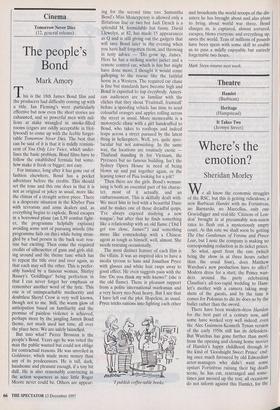Cinema
Tomorrow Never Dies (12, general release)
The people's Bond
Mark Amory
This is the 18th James Bond film and the producers had difficulty coming up with a title. Ian Fleming's were particularly effective but now even the short stories are exhausted, and so powerful men with mil- lions at stake wrangled in smoke-filled rooms (cigars are oddly acceptable in Hol- lywood) to come up with the feeble forget- table Tomorrow Never Dies. The best that can be said of it is that it is mildly reminis- cent of You Only Live Twice, which under- lines the basic problem. Bond films have to follow the established formula but some- how make it fresh or bigger; not easy.
For instance, long after it has gone out of fashion elsewhere, Bond has a pocket adventure before the credits. This should set the tone and this one does in that it is not as original or jokey as usual, more like the climax of a straight action piece. There is a desperate situation in the Khyber Pass with terrorists and arms dealers and, as everything begins to explode, Bond escapes in a borrowed plane (an 139 combat fight- er, the programme helpfully explains) avoiding some sort of pursuing missile (the programme fails on this) while being stran- gled by a bad person in the back seat: rou- tine but exciting. Then come the required credits of silhouettes of guns and girls slid- ing around and the theme tune which has to repeat the title over and over again, so that each may sell the other. This is prefer- ably bawled by a famous woman, Shirley Bassey's `Goldfingef being perfection in that I can never forget her emphasis or remember another word of the lyric. This one is of unimpeachable mediocrity and doubtless Sheryl Crow is very well known, though not to me. Still, the warm glow of anticipation based on familiarity and the promise of painless violence is achieved, perhaps more by the jangling James Bond theme, not much used last time, all over the place here. We are safely launched.
But into what? Pierce Brosnan is the people's Bond. Years ago he was voted the man the public wanted but could not oblige for contractual reasons. He was unveiled in Goldeneye, which made more money than any of its predecessors. He is tall, dark, handsome and pleasant enough, if a tiny bit dull. He is also reasonably convincing in the action sequences as nice little Roger Moore never could be. Others are appear- mg for the second time too: Samantha Bond's Miss Moneypenny is allowed only a flirtatious line or two but Judi Dench is a splendid M, formidable but funny. David Llewelyn, at 82, has made 15 appearances as Q and is still giving out the gadgets that will save Bond later in the evening when you have half forgotten them, and throwing in testy advice — 'Do grow up, James.' Here he has a striking scarlet jacket and a remote control car, which is fun but might have done more. I thought it would come galloping to the rescue like the faithful horse in a Western. The required car chase is fine but standards have become high and Bond is expected to top everybody. Ameri- can audiences are so familiar with the clichés that they shout `Fruitstall, fruitstall' before a speeding vehicle has time to send colourful oranges and apples rolling across the street as usual. More memorable is a motorcycle chase with a girl handcuffed to Bond, who takes to rooftops and indeed leaps across a street pursued by the latest thing in helicopters. Well, yes, quite spec- tacular but not astonishing. In the same way, the locations are routinely exotic — Thailand standing in for Vietnam, the Pyrenees but no famous building. Isn't the Sydney Opera House in need of being blown up and put together again, or the leaning tower of Pisa looking for a jolt?
Then there are the girls. Bond's woman- ising is both an essential part of his charac- ter, most of it actually, and an embarrassment. This is skilfully dealt with. We meet him in bed with a beautiful Dane and he makes one of those dreadful quips, 'I've always enjoyed studying a new tongue', but after that he finds something like a relationship with an old flame ('Did I get too close, James?') and something more like comradeship with a Chinese agent as tough as himself, well, almost. She needs rescuing occasionally.
The most distinct feature of each film is the villain. It was an inspired idea to have a media tycoon to hate and Jonathan Pxyce with glasses and white hair rasps away to good effect. He even suggests pain with the line 'Do you think my wife knows?' (she is the old flame). There is pleasant support from a polite international marksman and a very heavy neo-Nazi heavy. But I see that I have left out the plot. Hopeless, as usual. Pryce tricks nations into fighting each other 'I publish coffee-table books.' and broadcasts the world scoops of the dis- asters he has brought about and also plans to bring about world war three. Bond charges in, is captured, almost tortured, escapes, blows everyone and everything up, saves the world. Tens of millions of pounds have been spent with some skill to enable us to pass a mildly enjoyable but entirely forgettable two hours.
Mark Steyn returns next week.


















































































 Previous page
Previous page